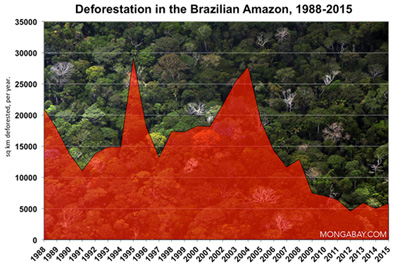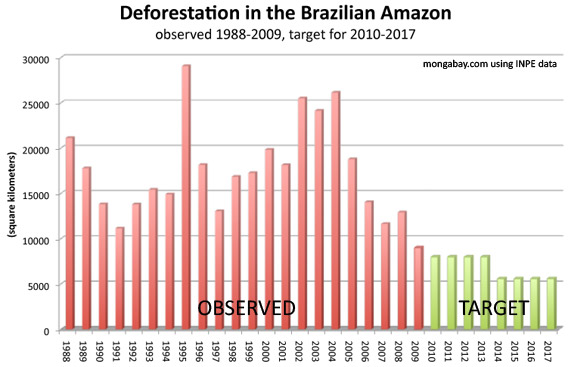A summit between South American leaders to devise a plan to save the Amazon, failed to come up with a “common stance” on deforestation, as five of the eight invited leaders failed to show up to the meeting, reports Al Jazeera.
Guyana’s president Bharrat Jagdeo and France’s Nicolas Sarkozy attended the meeting in Manaus, which was hosted by Brazil’s president, Luiz Inacio Lula da Silva.
Venezuela’s Hugo Chavez and Colombian’s Alvaro Uribe pulled out of the meeting over a political dispute. Leaders from Suriname and Bolivia, along with Ecuador’s Rafael Correa, who has pushed his own rainforest conservation plan, also missed the summit.

|
Nonetheless the apparent alliance between France and Brazil is significant going into next month’s climate negotiations in Copenhagen. France has a central role in the E.U., one the largest producers of carbon dioxide, while Brazil has recently committed to significant reductions in greenhouse gas emissions from deforestation.
The Manaus meeting focused on Brazil’s recent success in reducing forest clearing in the Amazon though better policing, new incentives to keep trees standing, and new protected areas. Brazil’s state-of-the-art satellite monitoring system for tracking was also highlighted.
Brazil is seeking compensation from industrialized nations for its efforts to curtail Amazon deforestation. Norway has already committed up to a billion dollars to Brazil’s Amazon Fund.

Amazon rainforest summit fizzles. Al Jazeera. November 27, 2009
Related
Brazil’s plan to save the Amazon rainforest

(06/02/2009) Accounting for roughly half of tropical deforestation between 2000 and 2005, Brazil is the most important supply-side player when it comes to developing a climate framework that includes reducing emissions from deforestation and forest degradation (REDD). But Brazil’s position on REDD contrasts with proposals put forth by other tropical forest countries, including the Coalition for Rainforest Nations, a negotiating block of 15 countries. Instead of advocating a market-based approach to REDD, where credits generated from forest conservation would be traded between countries, Brazil is calling for a giant fund financed with donations from industrialized nations. Contributors would not be eligible for carbon credits that could be used to meet emission reduction obligations under a binding climate treaty.
How to save the Amazon rainforest
(01/04/2009) Environmentalists have long voiced concern over the vanishing Amazon rainforest, but they haven’t been particularly effective at slowing forest loss. In fact, despite the hundreds of millions of dollars in donor funds that have flowed into the region since 2000 and the establishment of more than 100 million hectares of protected areas since 2002, average annual deforestation rates have increased since the 1990s, peaking at 73,785 square kilometers (28,488 square miles) of forest loss between 2002 and 2004. With land prices fast appreciating, cattle ranching and industrial soy farms expanding, and billions of dollars’ worth of new infrastructure projects in the works, development pressure on the Amazon is expected to accelerate. Given these trends, it is apparent that conservation efforts alone will not determine the fate of the Amazon or other rainforests. Some argue that market measures, which value forests for the ecosystem services they provide as well as reward developers for environmental performance, will be the key to saving the Amazon from large-scale destruction. In the end it may be the very markets currently driving deforestation that save forests.